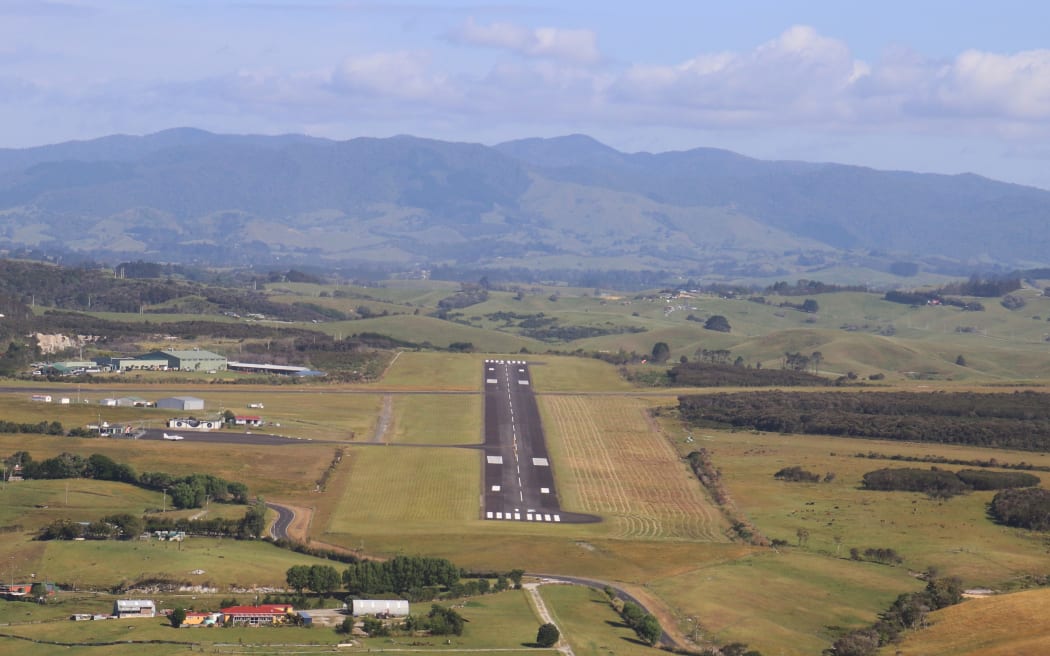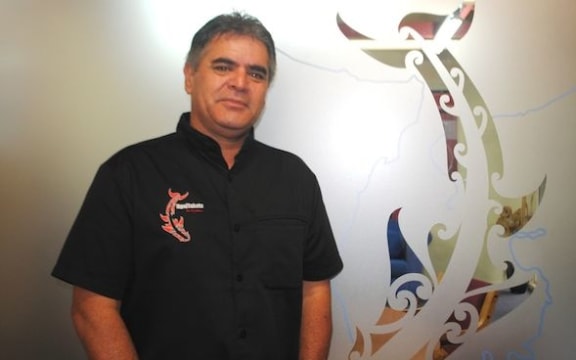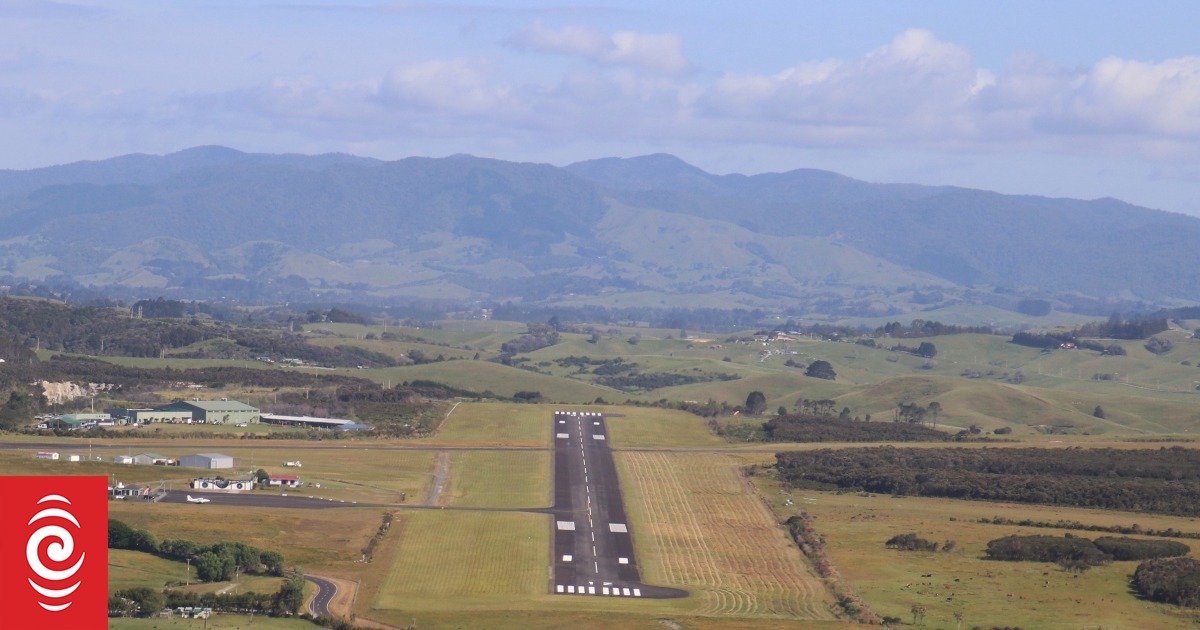
The future of Kaitāia Airport has long been mired in uncertainty.
Photo: RNZ / Peter de Graaf
New Zealand’s northernmost airport has been saved from closure after a local iwi negotiated a deal to buy the land and keep planes flying to Kaitāia for at least the next 35 years.
Uncertainty over the airport’s future has long caused concern in the Kaitāia community, whose road access to the rest of the country is regularly severed by slips and floods.
Fears over the airport’s future – and the land dispute at its heart – had prompted a protest group to plan an occupation from next Monday, which would have halted all flights in and out of the Far North town.
The occupation has now, however, been called off.
The disputed, Crown-owned airport land had been leased to the Far North District Council month-by-month since 2016, when the last long-term lease expired.
That arrangement was supposed to end in June this year.
It was extended by another six months but that still left the clock ticking on the airport’s future.
Ngāi Takoto leader Rangitane Marsden said a working group had been trying to reach a solution since April but progress had been slow, causing angst among Kaitāia residents.
As a result the iwi opted instead to negotiate directly with government ministers.
Marsden said the deal reached earlier this month would give “absolute certainty” the airport could keep operating for at least the next 35 years, and ensure the benefits were fairly shared.
The agreement would see Ngāi Takoto buy the airport land from the Crown – a valuation was underway to establish the price – then place it in a joint iwi-hapū trust.
Trust ownership would be split 50-50 split between Ngāi Takoto and three hapū of Ngāti Kahu, another Far North iwi, with connections to the land.

(File photo) Rangitane Marsden.
Photo: Te Rūnanga o Ngāi Takoto
The Crown would then reimburse Ngāi Takoto for the purchase, while in exchange the council would be given a free lease on the land to continue operating the airport.
The reimbursed funds would also go into a trust to be divided 50-50 between Ngāi Takoto and the three hapū.
The money would have to be spent on social programmes and marae upgrades, Marsden said.
Ngāi Takoto had six months to set up the trust.
The airport facilities also needed upgrading, including a new terminal, Marsden said.
Details of how any improvements would be funded, without placing any extra burden on ratepayers, were still being worked through.
When Air New Zealand pulled out of Kaitāia in 2015, the void was filled by regional airline Barrier Air.
The company now offers up to four return flights a day to Auckland in its 13-seater Cessna Caravans.
Chief executive Grant Bacon said he was delighted that years of “nerve-wracking uncertainty” had been resolved.
The Kaitāia service was initially only a small part of Barrier Air’s business but it had grown significantly, Bacon said.
“The service that we operate to Kaitāia has become a rather large part of our business and we’ve had fantastic support from the Kaitāia and the Far Far North community. To hear that a deal has been struck is a brilliant news for us,” Bacon said.
Demand for Kaitāia flights was stable year-round so it complemented the company’s other, more seasonal services.
‘Ecstatic’
Former Northland MP and Far North mayor John Carter, who lives just north of Kaitāia, said a deal securing the airport’s future had was the best news he had heard in months.
“I’m absolutely ecstatic. It’s an example of how important infrastructure is to communities. And it means Kaitāia can now look forward to a really positive future instead of us having to sit there wondering if it’s going to go or not.”
Carter said the airport was vital to the movement of freight and passengers, but also as an alternative transport link when the Far North was cut off by road – as was the case, since August last year, with State Highway 1 through the Mangamuka Ranges.
“The airport is another alternative, but an extremely important one, for our transport system.”
Meanwhile, Far North Holdings, the council-owned company that operates the airport, said it had received formal notice that the planned occupation of the airport had been called off.
The occupation would have stopped regular passenger flights by Barrier Air, air ambulance flights by Skyline Aviation, and Sunair charter flights carrying medical professionals to Kaitāia Hospital.
Chief executive Andy Nock said that meant the airport could safely remain open, which he called “a great result” for the Te Hiku community.
Council chief executive Guy Holroyd said the occupation plan was likely a reflection of frustration about ownership and management of the airport.
The decision to halt the occupation indicated progress was being made on the issue, he said.
Te Hiku ward councillor Felicity Foy said she was grateful to Marsden, iwi and hapū for getting a deal across the line.
She criticised the Crown, however, for failing to resolve the issue earlier and effectively holding the town to ransom.
With no security of tenure she said it had not been possible to invest in the airport, which was now well overdue for an upgrade.
Land dispute
A dispute over who owns the land is at the heart of the Kaitāia Airport conundrum.
The current legal owner is Crown agency Toitū Te Whenua Land Information New Zealand, but the land is subject to a Treaty claim.
Te Rūnanga a iwi o Ngāti Kahu chairwoman Margaret Mutu has previously said the land belonged to the Erstich whānau, specifically the descendants of Kataraina Matenga, of Patukoraha hapū, who married Ante Erstich.
The land was taken from Matenga, via her husband, for military purposes during World War II on the promise that it would be returned.
Some land was also taken from the neighbouring hapū, Ngai Tohianga, Mutu said.
It was taken using the Public Works Act, which required such land to be offered back to those it was taken from when it was no longer used for the original purpose.
The airport was occupied for two days in 2015 by protesters unhappy with the terms of the Te Hiku Treaty settlement.
Ngāi Takoto signed a Treaty settlement in 2012 but Ngāti Kahu has yet to settle.
Rangitane Marsden said Pat Snedden, who played a key role in the Te Hiku Treaty settlements, was engaged by government ministers Kelvin Davis (Te Arawhiti/Māori-Crown Relations) and Andrew Little (Treaty Negotiations) to carry out the airport negotiations.




